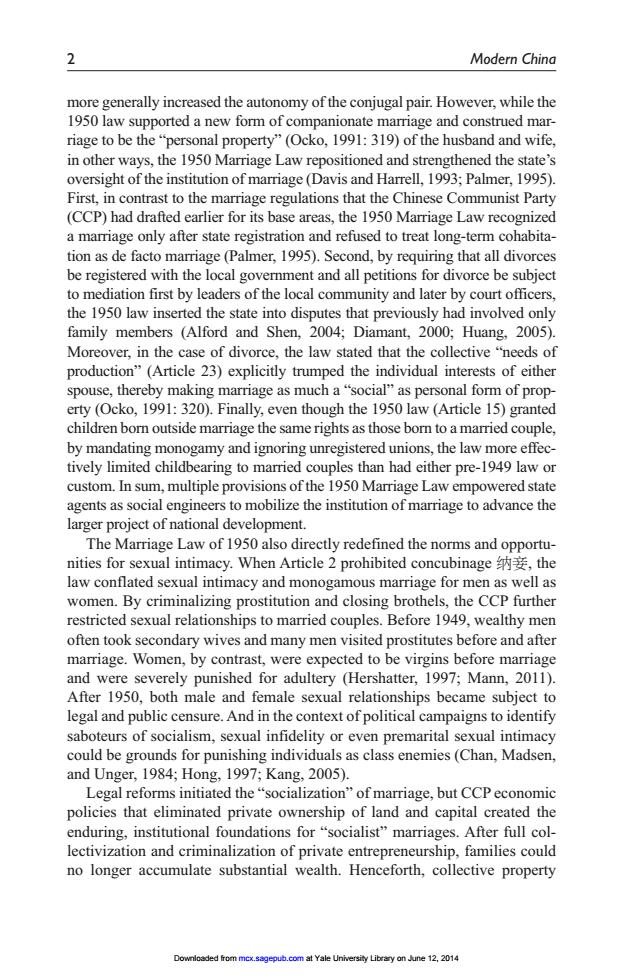正在加载图片...

Modern China more generally increased the autonomy of the conjugal pair.However,while the 1950 law supported a new form of companionate marriage and construed mar- riage to be the"personal property"(Ocko,1991:319)of the husband and wife, in other ways,the 1950 Marriage Law repositioned and strengthened the state's oversight of the institution of marriage(Davis and Harrell,1993;Palmer,1995). First,in contrast to the marriage regulations that the Chinese Communist Party (CCP)had drafted earlier for its base areas,the 1950 Marriage Law recognized a marriage only after state registration and refused to treat long-term cohabita- tion as de facto marriage(Palmer,1995).Second,by requiring that all divorces be registered with the local government and all petitions for divorce be subject to mediation first by leaders of the local community and later by court officers, the 1950 law inserted the state into disputes that previously had involved only family members (Alford and Shen,2004;Diamant,2000;Huang,2005). Moreover,in the case of divorce,the law stated that the collective "needs of production"(Article 23)explicitly trumped the individual interests of either spouse,thereby making marriage as much a"social"as personal form of prop- erty (Ocko,1991:320).Finally,even though the 1950 law(Article 15)granted children born outside marriage the same rights as those born to a married couple, by mandating monogamy and ignoring unregistered unions,the law more effec- tively limited childbearing to married couples than had either pre-1949 law or custom.In sum,multiple provisions of the 1950 Marriage Law empowered state agents as social engineers to mobilize the institution of marriage to advance the larger project of national development. The Marriage Law of 1950 also directly redefined the norms and opportu- nities for sexual intimacy.When Article 2 prohibited concubinage,the law conflated sexual intimacy and monogamous marriage for men as well as women.By criminalizing prostitution and closing brothels,the CCP further restricted sexual relationships to married couples.Before 1949,wealthy men often took secondary wives and many men visited prostitutes before and after marriage.Women,by contrast,were expected to be virgins before marriage and were severely punished for adultery (Hershatter,1997;Mann,2011). After 1950,both male and female sexual relationships became subject to legal and public censure.And in the context of political campaigns to identify saboteurs of socialism,sexual infidelity or even premarital sexual intimacy could be grounds for punishing individuals as class enemies(Chan,Madsen, and Unger,1984;Hong,1997;Kang,2005). Legal reforms initiated the "socialization"of marriage,but CCP economic policies that eliminated private ownership of land and capital created the enduring,institutional foundations for"socialist"marriages.After full col- lectivization and criminalization of private entrepreneurship,families could no longer accumulate substantial wealth.Henceforth,collective property Downloaded from mcx.sagepub.com at Yale University Library on June 12,20142 Modern China more generally increased the autonomy of the conjugal pair. However, while the 1950 law supported a new form of companionate marriage and construed marriage to be the “personal property” (Ocko, 1991: 319) of the husband and wife, in other ways, the 1950 Marriage Law repositioned and strengthened the state’s oversight of the institution of marriage (Davis and Harrell, 1993; Palmer, 1995). First, in contrast to the marriage regulations that the Chinese Communist Party (CCP) had drafted earlier for its base areas, the 1950 Marriage Law recognized a marriage only after state registration and refused to treat long-term cohabitation as de facto marriage (Palmer, 1995). Second, by requiring that all divorces be registered with the local government and all petitions for divorce be subject to mediation first by leaders of the local community and later by court officers, the 1950 law inserted the state into disputes that previously had involved only family members (Alford and Shen, 2004; Diamant, 2000; Huang, 2005). Moreover, in the case of divorce, the law stated that the collective “needs of production” (Article 23) explicitly trumped the individual interests of either spouse, thereby making marriage as much a “social” as personal form of property (Ocko, 1991: 320). Finally, even though the 1950 law (Article 15) granted children born outside marriage the same rights as those born to a married couple, by mandating monogamy and ignoring unregistered unions, the law more effectively limited childbearing to married couples than had either pre-1949 law or custom. In sum, multiple provisions of the 1950 Marriage Law empowered state agents as social engineers to mobilize the institution of marriage to advance the larger project of national development. The Marriage Law of 1950 also directly redefined the norms and opportunities for sexual intimacy. When Article 2 prohibited concubinage 纳妾, the law conflated sexual intimacy and monogamous marriage for men as well as women. By criminalizing prostitution and closing brothels, the CCP further restricted sexual relationships to married couples. Before 1949, wealthy men often took secondary wives and many men visited prostitutes before and after marriage. Women, by contrast, were expected to be virgins before marriage and were severely punished for adultery (Hershatter, 1997; Mann, 2011). After 1950, both male and female sexual relationships became subject to legal and public censure. And in the context of political campaigns to identify saboteurs of socialism, sexual infidelity or even premarital sexual intimacy could be grounds for punishing individuals as class enemies (Chan, Madsen, and Unger, 1984; Hong, 1997; Kang, 2005). Legal reforms initiated the “socialization” of marriage, but CCP economic policies that eliminated private ownership of land and capital created the enduring, institutional foundations for “socialist” marriages. After full collectivization and criminalization of private entrepreneurship, families could no longer accumulate substantial wealth. Henceforth, collective property Downloaded from mcx.sagepub.com at Yale University Library on June 12, 2014